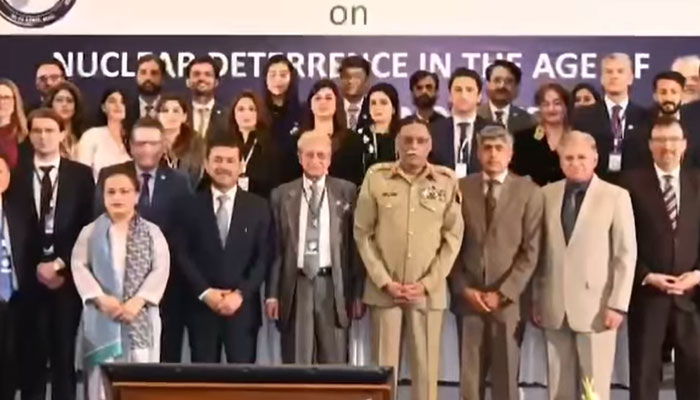AI, cyber capabilities threaten to destabilise global security order: experts
Ambassador Naqvi warned that proliferation of emerging technologies threatens to destabilise global security order
ISLAMABAD: International experts on emerging technologies have warned that proliferation of emerging technologies such as artificial intelligence (AI), cyber capabilities, and autonomous systems threaten to destabilise the global security order.
Addressing a two-day international conference titled “Nuclear Deterrence in the Age of Emerging Technologies,” on Tuesday here, the experts articulated their views on the first day of the moot that would continue today (Wednesday).
Sixteen international experts from Australia, Canada, China, Russia, Switzerland, the United Kingdom and the United States will examine the strategic implications of rapid technological advancements.
Pakistani experts underscored the national commitment to addressing risks posed by emerging technologies to international security and regional stability through dialogue and cooperation with global stakeholders.
The resolve was expressed during the opening of the two-day international conference organised by the Center for International Strategic Studies (CISS), Islamabad.
Ambassador Ali Sarwar Naqvi, Executive Director of CISS, while introducing the conference, warned that the proliferation of emerging technologies threatens to destabilise the global security order.
“These technologies, particularly when integrated into military systems, risk eroding the delicate balance that has prevented nuclear conflict for decades,” Naqvi said.
Ali Sarwar Naqvi noted that increasing reliance on unmanned vehicles and AI-enhanced surveillance introduces a host of ethical, legal and humanitarian challenges. “Emerging technologies are not only transforming conflict at the tactical level, but also eroding present deterrence frameworks,” Naqvi said.
The ambassador emphasised the urgent need for global consensus on regulatory mechanisms before the integration of these technologies into military doctrines. “Without agreed frameworks, their incorporation could pose serious risks to crisis stability and undermine arms control efforts,” he cautioned.
Speakers on the first day of the conference included Dr. Han Hua from Peking University; Dr. Xia Liping of the Center for Polar and Oceanic Studies, China; Dr. Naeem Salik of the Strategic Vision Institute, Islamabad; Anton Khlopkov of Russia’s Center for Energy and Security Studies; Dmitry Stefanovich from the Russian Academy of Sciences; Dr. Alexander Evans OBE of the London School of Economics; Dr. Petr Topychkanov of Lomonosov Moscow State University; Alice Saltini of the European Leadership Network; Dr. Jean-Marc Rickli of the Geneva Center for Security Policy; Dr. Zafar Khan of the Baluchistan Think Tank Network; Dr. Robert B. Hayes of North Carolina State University; and Dr. Tariq Rauf from Austria.
The conference’s further sessions exploring the intersection of strategic stability and emerging technologies would continue.
-
 It's A Boy! Luke Combs, Wife Nicole Welcome Third Child
It's A Boy! Luke Combs, Wife Nicole Welcome Third Child -
 Leading Astrophysicist Shot Dead At Southern California Home
Leading Astrophysicist Shot Dead At Southern California Home -
 Johnny Depp's Kind Gesture Towards Late 'Grey's Anatomy' Actor Eric Dane Before Death Laid Bare
Johnny Depp's Kind Gesture Towards Late 'Grey's Anatomy' Actor Eric Dane Before Death Laid Bare -
 How Princess Eugenie, Beatrice React To Andrew Arrest?
How Princess Eugenie, Beatrice React To Andrew Arrest? -
 Kylie Jenner 'convinced' Gwyneth Paltrow Is 'crushing' On Timothee Chalamet: 'It's Disrespectful'
Kylie Jenner 'convinced' Gwyneth Paltrow Is 'crushing' On Timothee Chalamet: 'It's Disrespectful' -
 Jemma Chan Reflects On 'difficult Subject Matter' Portrayed In 'Josephine'
Jemma Chan Reflects On 'difficult Subject Matter' Portrayed In 'Josephine' -
 Blood Falls In Antarctica? What Causes The Mysterious Red Waterfall Hidden In Ice
Blood Falls In Antarctica? What Causes The Mysterious Red Waterfall Hidden In Ice -
 AI Power Play: Nvidia Moves To Invest $30 Billion In OpenAI
AI Power Play: Nvidia Moves To Invest $30 Billion In OpenAI -
 Will Savannah Guthrie Ever Return To 'Today' Show? Here's What Insiders Predict
Will Savannah Guthrie Ever Return To 'Today' Show? Here's What Insiders Predict -
 Andrew Mountbatten-Windsor In A Fix Over New Disturbing TMZ Photos
Andrew Mountbatten-Windsor In A Fix Over New Disturbing TMZ Photos -
 Eric Dane Opened Up About Releasing His Memoir Just Two Months Before His Death Due To ALS Complications
Eric Dane Opened Up About Releasing His Memoir Just Two Months Before His Death Due To ALS Complications -
 Zendaya, Tom Holland Already Married? Actress Shows Off New Ring
Zendaya, Tom Holland Already Married? Actress Shows Off New Ring -
 King Charles Holds Emergency Meeting After Andrew Arrest: 'Abdication Is Not Happening'
King Charles Holds Emergency Meeting After Andrew Arrest: 'Abdication Is Not Happening' -
 Amazon Can Be Sued Over Sodium Nitrite Suicide Cases, US Court Rules
Amazon Can Be Sued Over Sodium Nitrite Suicide Cases, US Court Rules -
 'Vikings' Star Mourns Eric Dane's Death
'Vikings' Star Mourns Eric Dane's Death -
 Patrick Dempsey Reveals Eric Dane's Condition In Final Days Before Death
Patrick Dempsey Reveals Eric Dane's Condition In Final Days Before Death




